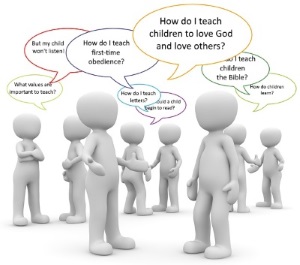A reader asked…
Any good ideas for dealing with lying?
That’s a tough one. Lying is a common issue with most preschoolers. Some even believe it is an important part of their development. Here are several reasons why preschoolers lie according to this source at BabyCenter:
• Forgetfulness.
• Wishful thinking.
• An active imagination. They struggle to understand what is real and what is make-believe.
• A need to feel good.
• A craving for attention.
• A sense of control.
And there is also the I-don’t-want-to-get-in-trouble reason.
So…if lying is age appropriate for preschoolers, how do we make sure that lying doesn’t become the norm?

1. Name It
Sometimes the best thing to do is not make a big deal out of a lie. Name it as “not the truth” and move on. For example, your child states that he made his bed, though you know he did not. Simply tell the child, “Adam, I know that you did not make your bed and that is not the truth. Go make your bed and report to me when you are finished.”
2. Stay Calm
Some kiddos love to see the adults in their lives get fired up, and you getting upset can be fuel to a child’s fire.
3. Don’t Set the Child Up to Lie
Especially for a child who struggles with telling the truth, phrase questions in a way that helps them tell you the truth. Instead of “Did you take the cookie without permission?”, say “You took the cookie, didn’t you.”
4. Trust and Honesty Go Hand in Hand
Discuss the marriage of trust and honesty. Why should we tell the truth? Why is telling the truth better than lying? What happens when trust is broken?
5. God Commands the Truth
Read Scripture verses about honestly. Talk about God’s view of lying. Here are a few.
Luke 16:10 1 Corinthians 13:6
Exodus 20:16 2 Corinthians 8:21
Leviticus 19:11 Proverbs 21:3
Proverbs 12:22
1 Peter 3:10-12 – “Keep Your Tongue from Evil” – Steve Green – Hide Them in Your Heart Vol. 1
6. Listen to the Holy Spirit
For the child who has accepted salvation, remind her that she has the Holy Spirit in her heart to help her make the right choice. Talk about listening to that voice.
7. Play Games that Encourage and Teach Honesty
One game is “True vs. Not True.” It helps a child see the difference between a truth and a lie.
8. Pray with Your Child
Pray with your child about being honest. Ask God to help the child tell the truth and convict the child when he is lying.
9. Set Expectations for Truth
Set clear expectations about honesty. We tell our children that lying will always add to their consequence.Praise the child when she has the courage to tell the truth.
10. Read Book About Honesty
Berenstain Bears and the Truth
Help Me Be Good about Lying – This is part of the Help Me Be Good series that is currently out of print. While I haven’t read this book, several have suggested it. You can purchase the Kindle edition.

God, I Need to Talk to You about Lying by Dan Carr
Let’s Be Honest – I love the simplicity and precious illustrations of the P.K. Hallinan books.
The Boy Who Cried Wolf – There are several options for this story.
My Young Child is a free website with various character education stories. There are two stories about honesty.

But there’s one more.
11. Lead by Example
Sometimes children learn how to lie by watching the adults around them. Ouch!
In subtle and sometimes not so subtle ways, we teach our children to lie. We tell our relatives we are excited to get together, but the child hears us tell our spouse that we would rather have a root canal. We tell the cashier that the item is on sale when our child knows it isn’t. We make copies of a CD instead of purchasing a copy for ourselves.
Just three examples of how we teach our children to be dishonest. We need to model the character traits that we desire because as we all know, “Virtues are caught more than taught.”
So let’s review.
Lying is a typical behavior for preschool-aged children. How we handle the lie and the example we display can determine whether it is a passing phase or it becomes a part of the child’s life.
Desire to be the best parent or teacher you can be? Join us in Rogers, Arkansas on September 21-22nd (brand new information) or Beaumont, Texas October 5-6th for an ABCJLM Parent/Teacher Conference. No matter the age of your children, you will find these conferences to be empowering, encouraging, and filled with practical tips.
EARLY REGISTRATION for the ARKANSAS CONFERENCE ENDS Monday, Sept 10th.






I'm actually having a lot of trouble with lying from my 4 year old. My 3 year old has a so far undiagnosed problem with his speech and has only a handful of words in his vocabulary that is actual audible english. Because of this, big brother takes that to his advantage most days by blaming everything on his little brother because he knows i wont be able to get an audible answer from him. To add to that dishonesty that occurs about 50% of the time, the other 50% occurs when some days he takes the blame for things he didn't do. For example, a couple months ago I came across a puddle of pee… in the bathtub… and when I asked my boys how it got there he stated "i peed in the bathtub". Seemed like case closed to me. My fiance and I just got full custody of both boys, they are his from his ex wife who was a very … incapable…. mother, and it wouldn't be the first time he acted out, we just assumed he was dealing with the transition. I have never raised any children so I simply gave him the benefit of the doubt (why would he lie to get in trouble?). After a timeout I had him thoroughly clean the bathtub. Not even an hour later I found the dog belonging to a friend of mine who was staying with us for the week, in the bathtub peeing… again, why would he lie to get in touble!?!?!?!
I see I've written a story rather then a comment, but to sum it up.. lies occur so often i just don't know what to believe anymore, i want to be fair and of course i want to give them the benefit of the doubt, but i also don't want to punish the wrong child for no reason.
Lying it hard. I am sorry that you are having so much trouble. You may want to do some roleplaying with stuffed animals or toy figures to discuss lying. Hope that helps.
Lying is a VERY common problem for children from incapable parents. My adopted son was dishonest for years over things that really didn’t matter, and others that did; I can say that if you are consistent it works. My adopted son is now 17 and came to tell me one morning that he had thrown a soda all over his friend’s car (actually it was a family car said friend was not supposed to have out) and he wanted to clean it up, which he did and I got a phone call later from other family telling me they were impressed by my son and his effort and honest regret for the mistake, which I never had to punish.) Disciplining him, in general, was like hitting your head against a wall, repeatedly. He would something over and over and over ad nauseum. Trying counselling for the kids (I would add a counselor who sees foster/adopted kids). Also, when you look for resources raising these kids will be more like raising foster/adopted kids than biological kids; I now have both and while I love them the same I can raise my biological kids in a more relaxed manner than what worked with my adopted son. Get books for adopting parents and use resources for them, they will be far more helpful. Also Boundaries with kids by Cloud is good.
Brenda – Thank you for sharing these ideas!